
Hi readers,
First, the big personal news — I’m married! Emma and I had a very small ceremony in the desert town of Moab, Utah, where we enjoyed a week of hiking, UTVing, eating, and dancing with our immediate family, and we’re back for a few weeks before heading out to our honeymoon in Japan. Thanks to all my readers/colleagues/friends for your kind notes!
But before the honeymoon, I have some “behind the scenes” projects to write about at a16z 🙂
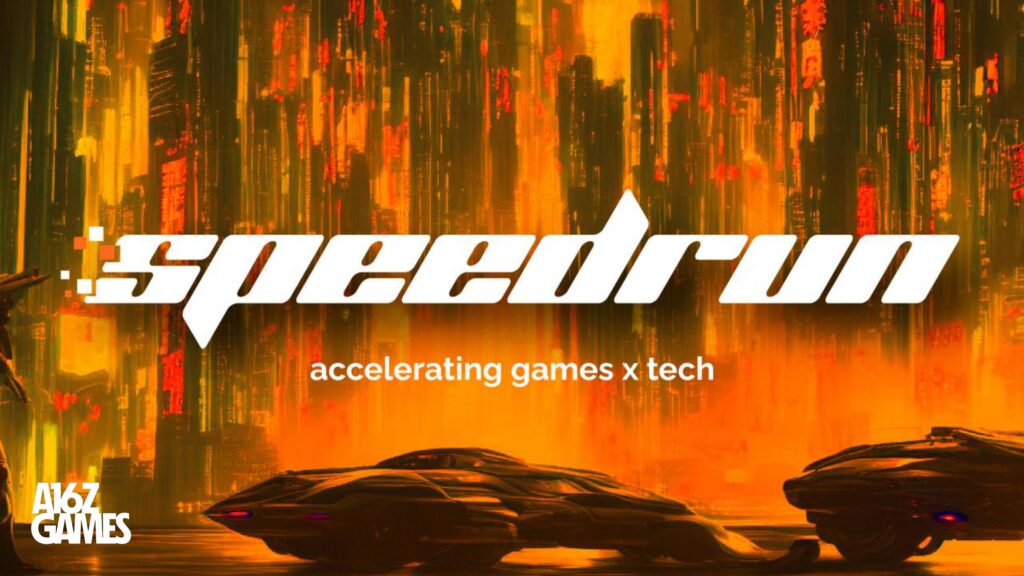
Behind the scenes at a16z
It’s been fun to build in public and share the behind-the-scenes on my work at Andreessen Horowitz. This past year, the primary focus has been to incubate and launch our new games fund (I recently shared the pitch deck we used to raise $660M). I’ve learned a ton in our first year of investing, and I wanted to follow up on all of this to talk about a new effort we’ve launched called SPEEDRUN, the first startup accelerator focused on the intersection of Games x Tech — where we invest $500k in startups focused on everything from AI, AR/VR, web3, infra, game studios, and more. We target startups at the very earliest stages of development, often teams without products or metrics.
If this sounds interesting to you, please join the program!
Apply to SPEEDRUN 2024. (deadline 9/30/2023)
But before I get ahead of myself, let’s start with a little history.
What are the biggest problems founders face?
Back in 2020 when my colleague Jon Lai and I were starting to invest in the intersection of Games and Tech, we would often sit in a16z’s offices in Menlo Park and talk about some of the structural challenges of building a startup in the industry. Although the sector is 100% software and fully digital, it had its own quirks as it was its own self-contained community.
And also, founders are founders. They want to connect with each other, learn the latest, and they want to raise money. These are universal, but for our sector of Games x Tech, we noted a few concrete problems:
- There’s not really a startup community within Games x Tech. I’ve been investing in the sector for the past few years, and although there are plenty of companies, and some big conferences (like the Game Developers Conference), there isn’t really a place focused on founders and new startups. A lot of it is for very large game developers. So it would be *amazing* to be able to create that, so that folks can learn from each other
- There’s a lot of unique knowledge, and founders have a lot to learn from each other. The reality is, most of the best new strategies and techniques aren’t written down. And things are always changing. Founders have to learn from each other. And if you are in a specific industry, like the intersection of games and tech, then the knowledge and relationships are often even more obscure — from picking game engines to launching on Twitch to Discord, to what’s cutting edge in AI — there’s just a lot. So there’s an opportunity to bring people together.
- It’s great to support a large, diverse, set of first-time founders. When we see 1000s of startup ideas each year (and yes, it really is that many), you inevitably end up trying to back the tried-and-true founders that are starting their second or third company. Or wait for traction. Yet so much innovation comes from people trying for the first time. They have unique challenges — in particular quitting their job 🙂 — and also finding cofounders, picking the idea, etc. By doing an accelerator where there’s a larger batch of companies, you inevitably are able to build more.
- Raising money is hard, but particularly so folks building a new game. There’s often fewer angel investors and seed funds to be the first dollar into the Games x Tech intersection. And founders may not be as familiar either — although very valuable companies like Roblox, Supercell, Riot, etc have been started, the industry has mostly focused on game publishers doing revenue shares and minimum guarantees to finance development. (Kind of like music, or movies). Venture capital isn’t as well understood or known, and founders often have a tough time connecting with angels and seed firms. And for tech companies that intersect with games (like a next gen Twitch, Discord, Unity, or that kind of thing) you often found yourself educating investors, who might not have the relationships and network inside the industry.
From the founders’ perspective, the above challenges presented major obstacles to building new startups. I’ve often remarked that it feels a bit like 2005 where there aren’t hundreds of angel investors and dozens of seed investors to get these new companies off the ground. There aren’t games-specific GPs at every major fund (whereas there are for SaaS!). And although Games have incredible cultural impact, it’s not well understood as an investment area.
However, in 2020 gaming was just one sector of several that I covered in the a16z consumer venture fund, and we couldn’t do much. However, with the creation of GAMES FUND ONE last year, we were able to think about these problems from scratch, and with it, we decided to run the experiment to solve some of these issues, by building an accelerator that combines education, community, capital and more.
We rallied the team inside a16z to begin putting together the idea, then announced it earlier this year. The result: 1600+ companies applied. Whoa. I ended up ending an email to the whole team saying, hey, this is all we’re going to be working on now 🙂 and it’s going to take so much work we might all suffer some burnout. But it’s going to be fun. And then we started cranking.
An accelerator overview
Let me take y’all through some slides on how we describe SPEEDRUN to our founders.
First, we talk about SPEEDRUN as an accelerator because we want to target startups at the moment of formation, really pre-seed or seed. This has a ton of advantages, starting with the fact that $500k goes a long way. And we can bundle it with education, a community, and mentorship, so that people have a great experience. It also allows us to share the companies with a wide set of angels and seed investors, to build the ecosystem.
When we ran the first SPEEDRUN batch, it looked like this:
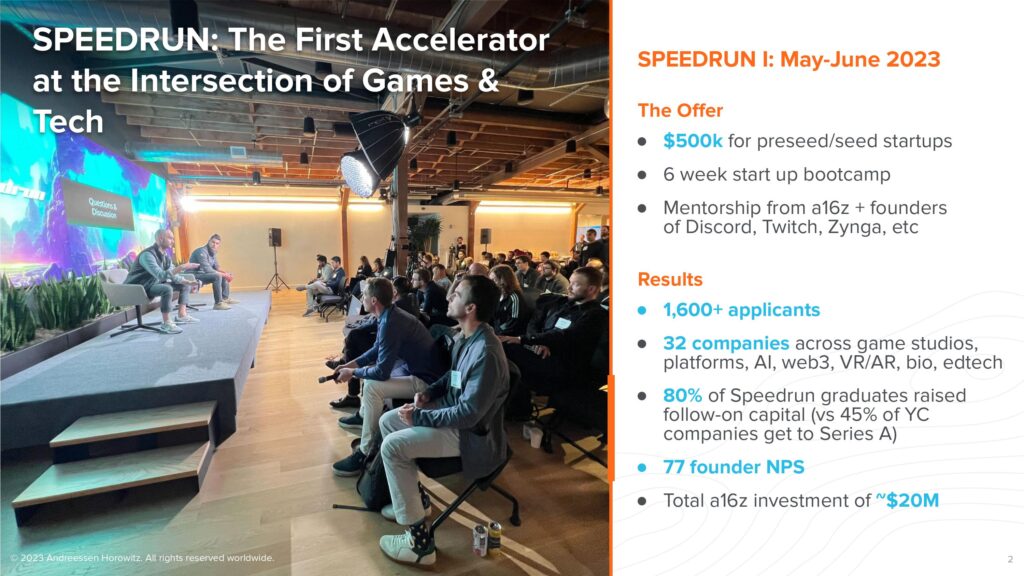
The offer is kind of a slam dunk to new startups. It’s a good bit of capital for a new team — $500k — and you don’t need a product launched or even built. The value prop is as much about the capital as solving the other problems I mentioned earlier on connecting with a founder community, learning the cutting edge, etc. So that was great, and we were pleased by how many companies applied.
One of the big lessons from the first batch was — oh man, it is a lot of work. We ended up taking the entire team and we basically all worked on SPEEDRUN for the entire two months we were putting it on. If any of you have been involved in organizing individual marketing events, this was like organizing 20+ in a row. This included speaker talks, social events, office hours, a kickoff and closing program, a demo day with hundreds of attendees, and more. It was a lot of work, but also very rewarding.
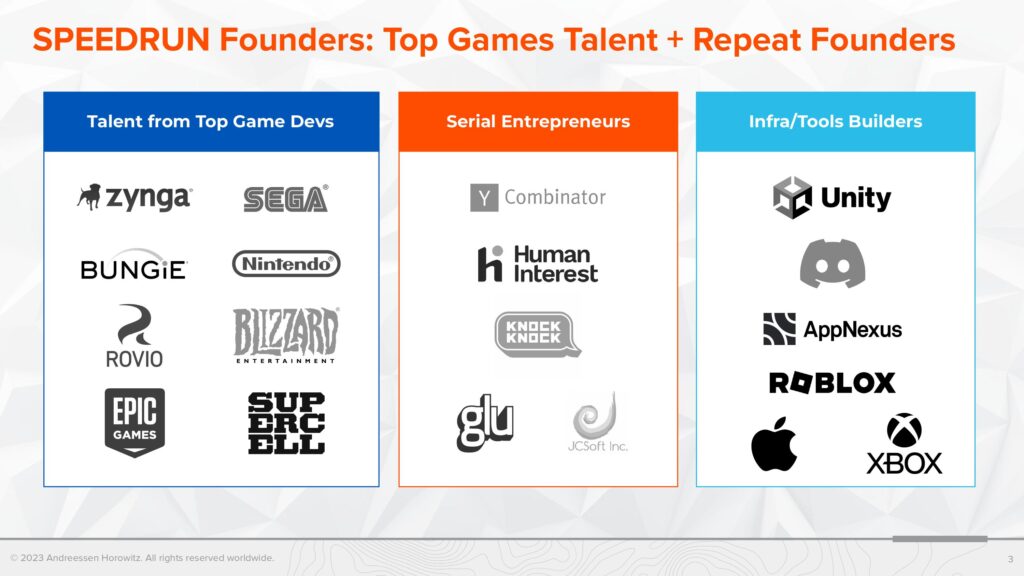
Above: SPEEDRUN ended up targeting founders who had worked either at games companies or in adjacent tech companies. We had 1600+ apply for SPEEDRUN 1 (and we’re at 2000+ for SPEEDRUN 2) and we ended up selecting a few dozen — so the conversion rate is well below 2%, more selective than a top university. But it wasn’t all based on resume, we also had very interesting people who just built really cool products with great traction, and we funded them based on their progress.
The way it works is pretty simple — someone has to actually go through thousands of applications 🙂 And then you select out a subset to interview (probably <5-10% of the overall), and then you select down again until you’re <2% of the total number. This obviously means a crazy number of 15 minute interviews, and you have to be very selective, but it’s also incredibly fun to hear so many ideas and meet great folks.
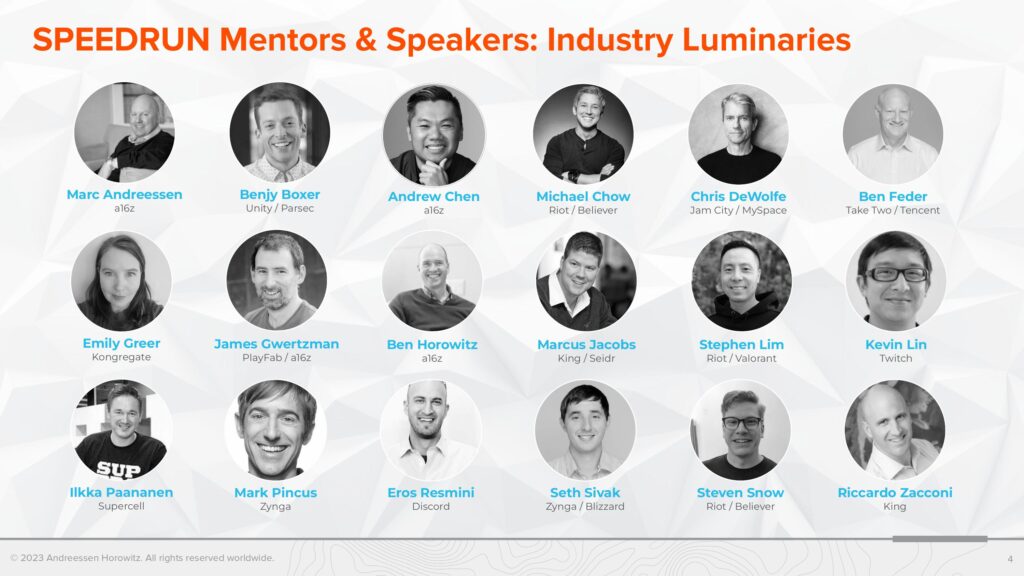
Above: One of the primary draws was the amazing speakers we were able to bring into the mix. This included interviews and lectures from the creators/founders of Zynga, Valorant, Twitch, Supercell, King (aka the creators of candy crush!), and much more. We also had a bunch of fantastic lunches with folks like Ben Horowitz and Marc Andreessen here at a16z, which was fun for all the founders.
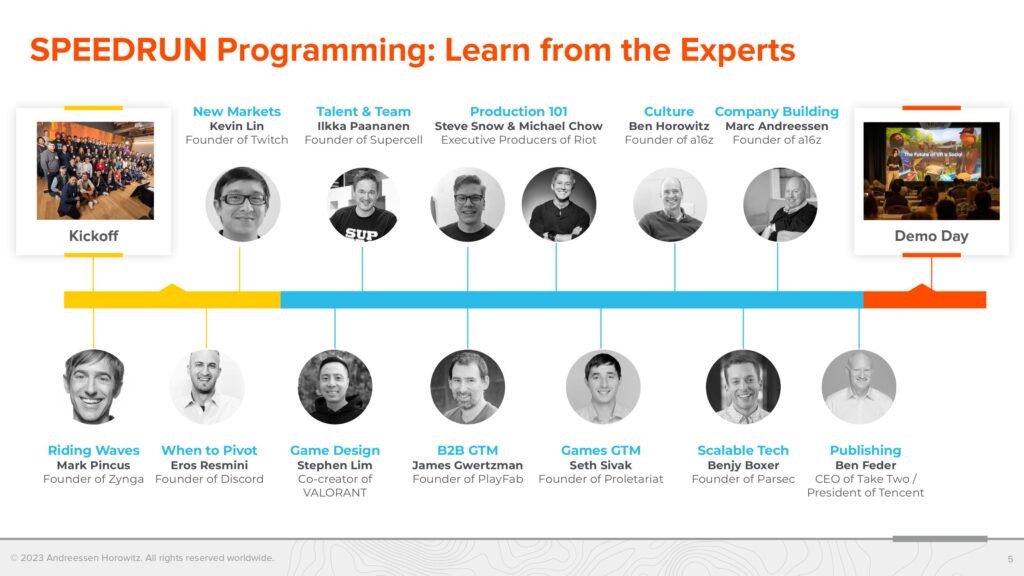
Above: The program we designed emphasized a structured program. This included frequent lectures on every aspect of creating a new startup, from fundraising to picking an idea to everything else. We layered on social events and a ton of time to connect with other founders and office hours with the a16z team.
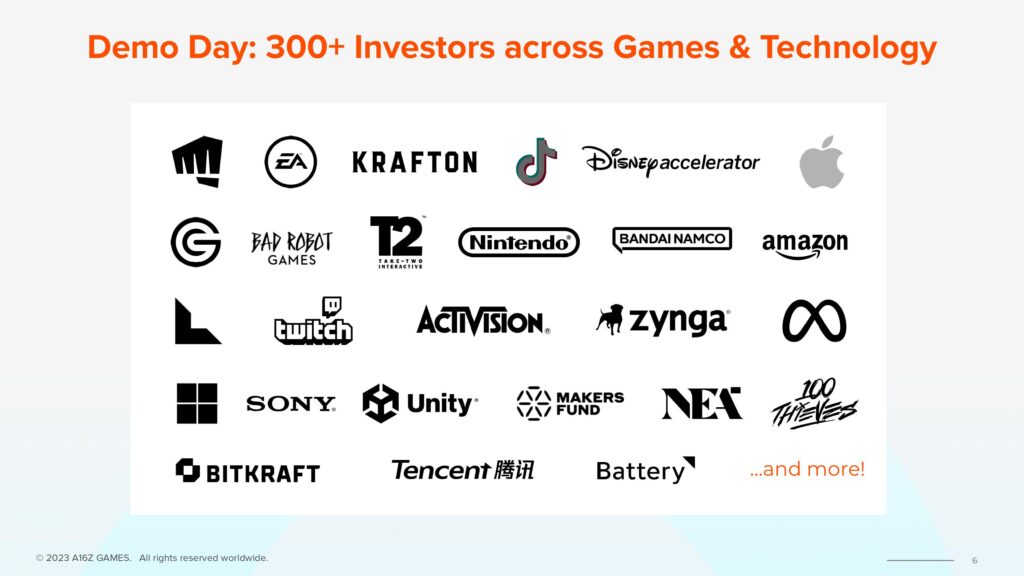
Above: The finale was a Demo Day in front of many of the most important and influential companies and VCs in the industry. Over 80% of the startups were able to raise additional money, and we helped coach them, gave them tips on the follow-on process, and we ended up with a ton of great co-investors.
End to end, the program was just under two months, and by the end of it, the startups in the program had more capital, had built a community, and learned a ton of new skills for the next phase of their adventure.
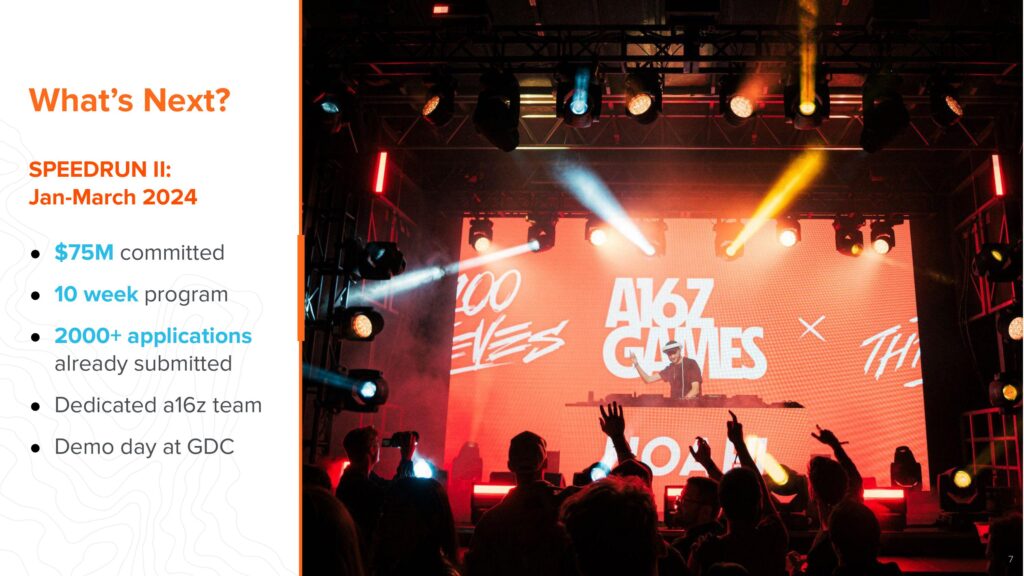
Above: Ultimately, we declared SPEEDRUN 1 a success and doubled down with a new program for 2024. We made a bunch of changes, including putting a full-time team to focus on it. We increased the length of the program, committed $75M of our games fund towards supporting the companies, and made a ton of changes both big and small to make SPEEDRUN 2 even more of a success.
The aftermath
It was a blast to take an idea from 2020 that came up during a brainstorm, and turn it into a real thing a few years later once we had the resources. The past few quarters have felt the most like launching a new product as I’ve had inside of venture capital. It reminds me of the good old days when I actually designed and launched products for a living 🙂
As you can tell from my writeup on this, overall we consider this whole effort a success and it’s been a blast to put together. We’ll be doing this many more times, and adding this as one of our major investing motions — in addition to our usual big checks into Series A and B companies, as well as later stage companies, we’re now going to be operating an accelerator! Kudos to the entire a16z games team for making it happen, it was a huge team effort.
Expect more updates on this (and other fun new initiatives at a16z) over time on this blog. I’d love to share, as much as I can, my thinking as we navigate the idea maze of starting a new fund inside the games industry. Super fun. And finally, if you are a founder and interested to apply to a future SPEEDRUN program, here is the link to do that.
PS. Get new updates/analysis on tech and startups
I write a high-quality, weekly newsletter covering what’s happening in Silicon Valley, focused on startups, marketing, and mobile.
Views expressed in “content” (including posts, podcasts, videos) linked on this website or posted in social media and other platforms (collectively, “content distribution outlets”) are my own and are not the views of AH Capital Management, L.L.C. (“a16z”) or its respective affiliates. AH Capital Management is an investment adviser registered with the Securities and Exchange Commission. Registration as an investment adviser does not imply any special skill or training. The posts are not directed to any investors or potential investors, and do not constitute an offer to sell — or a solicitation of an offer to buy — any securities, and may not be used or relied upon in evaluating the merits of any investment.
The content should not be construed as or relied upon in any manner as investment, legal, tax, or other advice. You should consult your own advisers as to legal, business, tax, and other related matters concerning any investment. Any projections, estimates, forecasts, targets, prospects and/or opinions expressed in these materials are subject to change without notice and may differ or be contrary to opinions expressed by others. Any charts provided here are for informational purposes only, and should not be relied upon when making any investment decision. Certain information contained in here has been obtained from third-party sources. While taken from sources believed to be reliable, I have not independently verified such information and makes no representations about the enduring accuracy of the information or its appropriateness for a given situation. The content speaks only as of the date indicated.
Under no circumstances should any posts or other information provided on this website — or on associated content distribution outlets — be construed as an offer soliciting the purchase or sale of any security or interest in any pooled investment vehicle sponsored, discussed, or mentioned by a16z personnel. Nor should it be construed as an offer to provide investment advisory services; an offer to invest in an a16z-managed pooled investment vehicle will be made separately and only by means of the confidential offering documents of the specific pooled investment vehicles — which should be read in their entirety, and only to those who, among other requirements, meet certain qualifications under federal securities laws. Such investors, defined as accredited investors and qualified purchasers, are generally deemed capable of evaluating the merits and risks of prospective investments and financial matters. There can be no assurances that a16z’s investment objectives will be achieved or investment strategies will be successful. Any investment in a vehicle managed by a16z involves a high degree of risk including the risk that the entire amount invested is lost. Any investments or portfolio companies mentioned, referred to, or described are not representative of all investments in vehicles managed by a16z and there can be no assurance that the investments will be profitable or that other investments made in the future will have similar characteristics or results. A list of investments made by funds managed by a16z is available at https://a16z.com/investments/.
Excluded from this list are investments for which the issuer has not provided permission for a16z to disclose publicly as well as unannounced investments in publicly traded digital assets. Past results of Andreessen Horowitz’s investments, pooled investment vehicles, or investment strategies are not necessarily indicative of future results. Please see https://a16z.com/disclosures for additional important information.